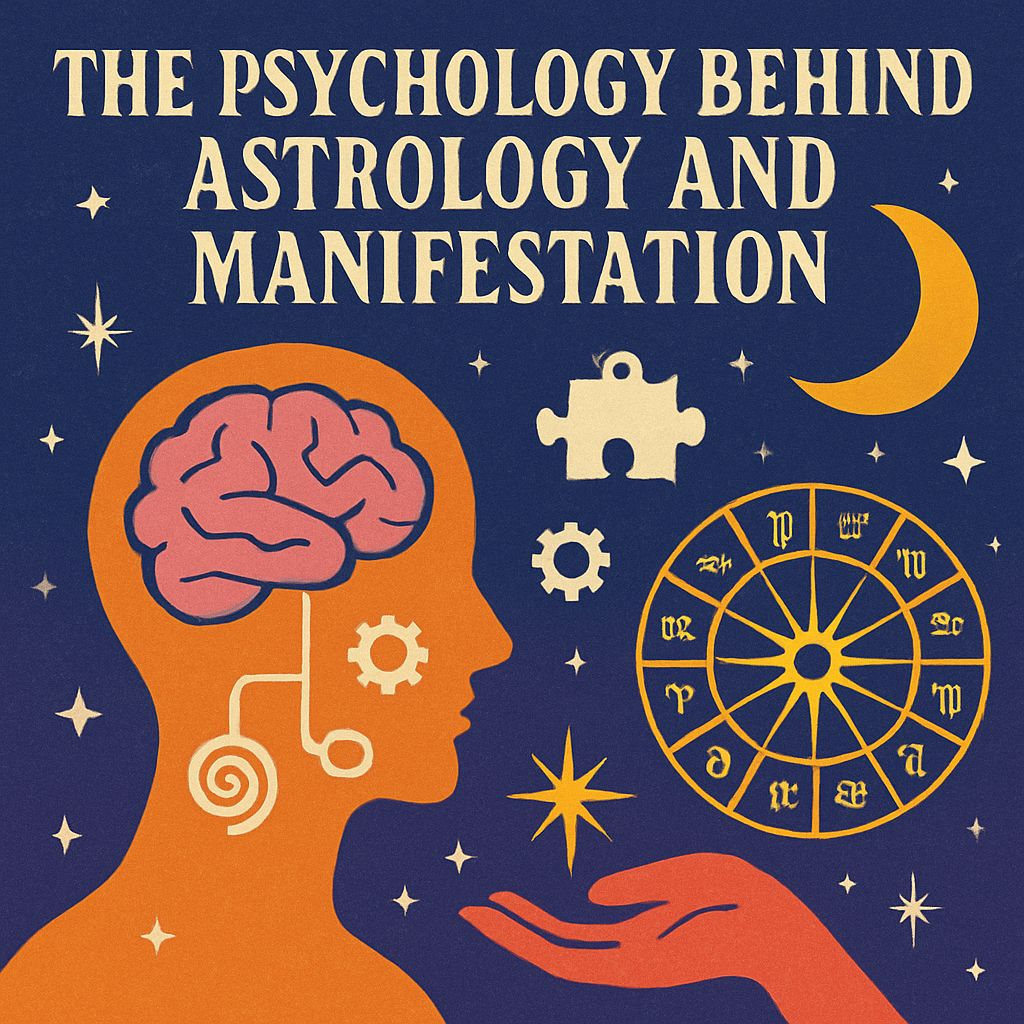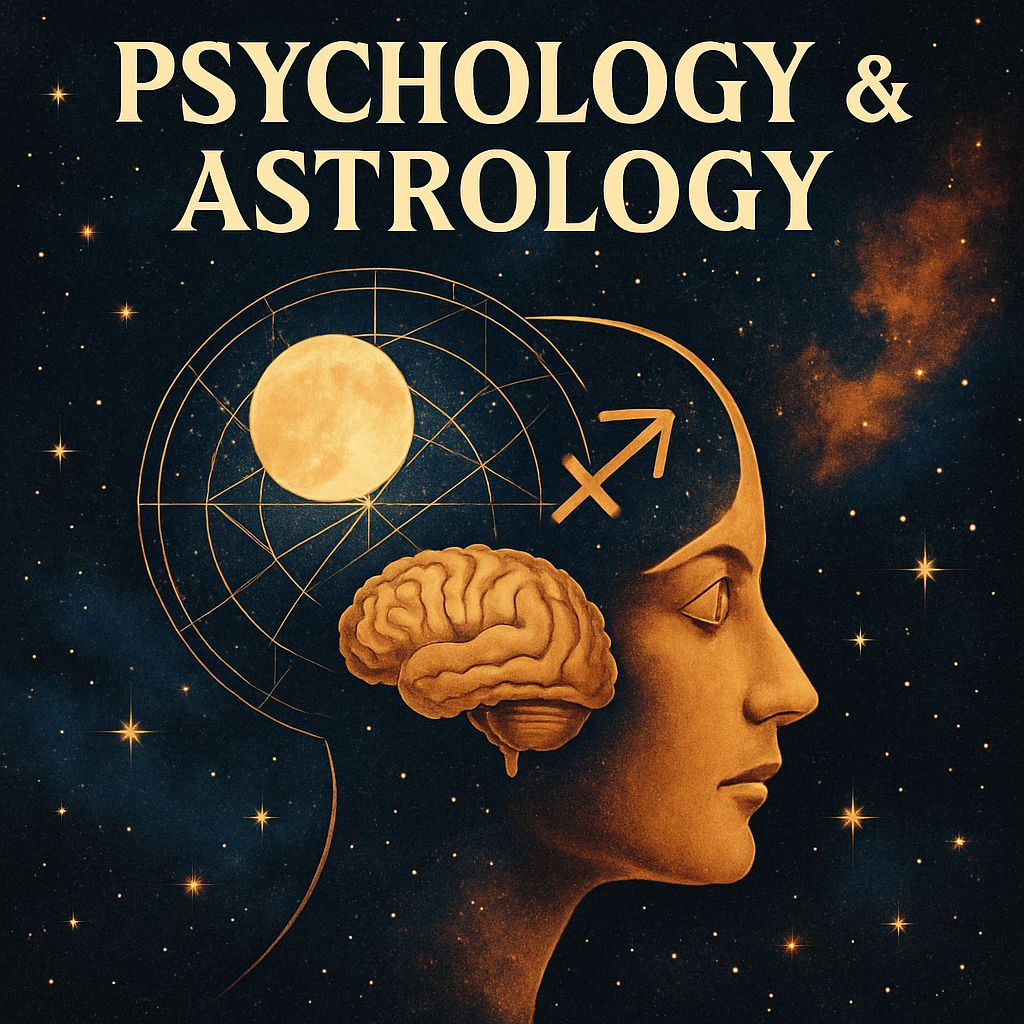The Psychology Behind Astrology and Manifestation

In the present day, obtaining a sense of self-knowledge and agency is more urgent than ever.
Two ancient practices (which I mention for graciousness) are astrology and manifestation. These two practices seem to have undergone a revival, particularly among younger generations.
While both abound in mystical overtones, these practices also seek to clearly articulate how we psychologically respond to the world and how that can shape our cognition, behavior, and decision-making.
But why do so many people turn to the stars, or recite affirmations to incarnate their dreams? In some sense, the answer is wrapped up in the complex relationship that exists between beliefs, cognition and emotional needs.
Now let's look to the Psychology behind Astrology and Manifestation

Astrology: A Mirror to the Mind
Astrology is based on the idea that celestial bodies affect human behavior and destiny. While there is no empirical evidence to propose a direct impact on the positions of celestial bodies in our lives, astrology survives because it brings psychological comfort to individuals.
One psychological explanation for the appeal of astrology is the Barnum Effect – the predisposition of individuals to accept vague, general statements about themselves as highly accurate. A horoscope that states a person is “creative but sometimes insecure,” is appropriate for all individuals. Yet, we see the statement as personally meaningful evidence that astrology works.
In addition, astrology offers a framework that caters to the profound human desire for structure and certainty. Life can feel chaotic, and astrology provides a system of order and a framework for understanding individual characteristics, life events, and relationships. The experience of order gives people comfort, especially during times of crisis and sometimes serves as a tool for emotional regulation.
Astrology also provides a framework for self-reflection. When reading about the positive and negative attributes of your sun sign, engaging with this can encourage self-reflection and examination of your strengths and weaknesses.
Whether your friends or family are talking about Mercury in retrograde or your Saturn return, these astrological events encourage people to slow down, evaluate, and realign their hopes and dreams in much the same way as therapy does.
Manifestation: The Power of Belief
Manifestation operates on the concept that you can bring desired outcomes into your life by concentrating your thoughts and feelings on that desired outcome. As a practice, manifestation gained prominence through books such as The Secret and social media trends surrounding scripting and vision boards, and as a result, it has been vilified within popular media as pseudoscience; however, psychology offers some fascinating explanations to support exactly why it can feel so powerful.
The practice of manifestation means that you are using the law of attraction, which is the premise that your positive thoughts or negative thoughts will create positive outcomes or negative outcomes. Sure, our universe is likely not going to change to fit our needs, but our cognition changes in significant ways.
When you set a goal and then concentrate on it, like wanting a new job, you are more attuned to opportunities and will more likely act and choose to accomplish that goal. This process is facilitated by the Reticular Activating System (RAS) located in the brain.
The RAS processes all the sensory data from the outside world, but because of finite resources, does not give equal weight or attention to all sensory data. The RAS accelerates the information that is important to you. So when you visualize success, you train your brain to be on the lookout for relevant sensory cues, and as a result, amplify your motivation and confidence.
Typically, manifestation also involves the use of positive affirmations, to potentially reshape self-limiting beliefs. For example, you may think it sounds ridiculous to repeat “I am worthy of success” regularly; however, if you regularly repeat affirmations over time, they will work to support the process of cognitive restructuring, which is an active strategy used in cognitive behavioral therapy (CBT). Affirmations will actively challenge negative thought processes or beliefs and help someone think in a more empowered way.
The Role of Belief and Ritual
Astrology and manifestation both manage belief systems. Psychologically speaking, belief acts as a coping strategy. It enables us to cope with uncertainty, decrease anxiety, and promote hopefulness. Those who feel a lack of control in their lives seek certainty in practices of astrology and manifestation because they restore a sense of agency.
Beyond the astrologer and manifestation practitioner, we feel the accountability of the rituals associated with astrology and manifestations, of reading a daily horoscope, journaling about manifestations, and lighting candles during full moons.
These rituals provide accountability, discipline, and a way to manage chaos in our lives. Rituals have been shown to reduce stress, increase performance, and develop emotional resilience. Whether investing in spiritual or secular practice, having rituals in our lives provides meaning and intention regardless of circumstance.
Social and Cultural Reinforcement
Part of the growth in astrology and manifestation may also be linked to social psychology. When a person sees their friends, influencers and online communities endorsing these practices, the social proof rationalizes the behavior. In particular, the digital spaces of Instagram and TikTok are like temples, where the algorithm promotes astrology memes and manifest success in a way that normalizes the behavior.
The social nature of belief should not be overlooked. People working together in a community through participating in a ritualistic practice or adopting a shared ideology creates belonging in an increasingly fragmented world. Many practitioners do not see astrology and manifestation as just personal tools in one’s toolkit but as part of their cultural identity.
When It Becomes Harmful
It’s important to recognize the cautions, even when there are benefits. Overindulgence in astrology or manifestation can lead to magical thinking or avoidance of responsibility.
For example, not engaging in conflict resolution, but only blaming your poor interactions on the “current effect of Mercury retrograde.” Or, not acting to make a manifestation a reality, and instead waiting for it to “come true,” is not a useful position.
Psychologists focus on looking for balance in life and belief systems – use them to empower you, not to limit you, to empower you to act in the world, not in place of action.
Conclusion: Psychology in Disguise

Ultimately Astrology and Manifestation, while magical, are fundamentally psychological processes that allow people to reflect and regulate emotions, set goals, and create a sense of connection.
Regardless of whether the stars have aligned in your favor or you have scripted your ideal life in a journal, the practice doesn’t matter as much as the belief, intention, and action that go along with that experience. When we understand the psychology behind these practices, we no longer see them as magical, but we recognize them as significant avenues for growth and well-being.